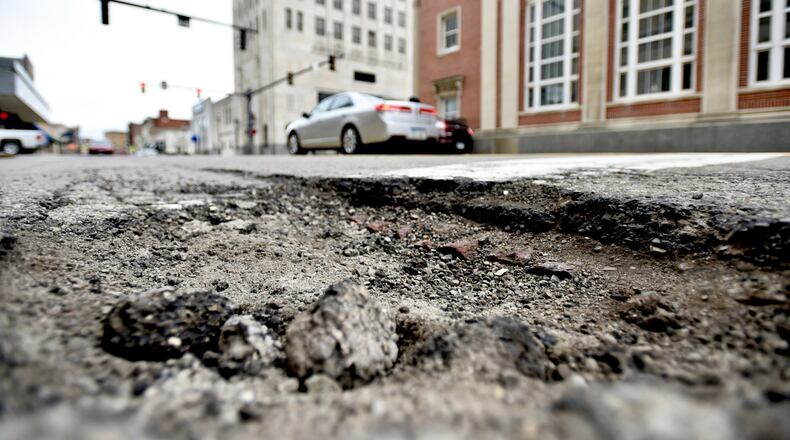Butler County was included in the declaration because there are highways, roads and bridges that are part of the “federal aid highway system.” The designation was a first step required to qualify for emergency federal funding. Potholes do not qualify.
“It’s better for us as a state to submit more counties than we actually believe there is actual damage as it stands today,” said Matt Bruning, a spokesperson for the Ohio Department of Transportation.
“Because it’s much harder to add things on after the fact. Let’s say we submitted 14 counties instead of 37 and next week a sink hole appears in a road in Butler County, wow that clearly has not just developed overnight that’s probably from that rain event we had in February… It’s easier to just have already had them on the list.”
Oxford is one of the jurisdictions in the federal highway system because it has U.S. 27 — the qualifying roads do not have to be federal highways necessarily — running through it.
City Engineer Scott Otto said he received a notification from the Ohio Department of Transportation that indicated Oxford won’t be receiving any money.
RELATED: Changing weather has created ‘an ongoing nightmare’ of problems in Butler County
“I received an email from ODOT this morning about guidance on this emergency declaration where it says anything that was serious or catastrophic with long-term closures. We didn’t have anything like that,” Otto said.
Butler County Engineer Greg Wilkens said the weather aftermath here hasn’t been a serious as in other parts of the state.
“They’ve got to be pretty catastrophic incidents before you’re going to get any of that federal money. I don’t think we have anything that’s going to be eligible for that,” Wilkens said. “From our past experience and with this type of funding you’ve got to have big slips, something that’s going to be closed for days or weeks.”
Columbia Parkway in Hamilton County, which experiences landslides, is an example of a location that could qualify for the funds, according to Wilkens.
Brian Cunningham, public information officer for ODOT District 8 that is responsible for state roads in Butler, Clermont, Clinton, Greene, Hamilton, Preble and Warren counties, said ODOT will only be applying for federal funding for Clermont and Hamilton counties.
He said the “pothole patrol” and routine maintenance continues in the county and there haven’t been any major issues recently.
“My understanding is Butler County is in pretty decent shape,” Cunningham said.
That wasn’t the case a few weeks ago when road crews described dealing with the potholes as “an ongoing nightmare.”
Tim Franck, the community services director for West Chester Twp., said there was an added level of difficulty this year because after the first freeze the roads didn’t thaw completely, and then the heavy rain came.
“The ground was saturated, and there was a frozen layer, so that water ran rather than soak in,” Franck said. “It overwhelmed some areas as far as drainage is concerned. Then you get cold weather again.
“The freeze/thaw cycle is very difficult on the roads. The slightest crack or imperfection on the pavement can allow a little bit of moisture to get in, and when you get the freeze/thaw cycle, that’s what causes those pot holes.”
About the Author
